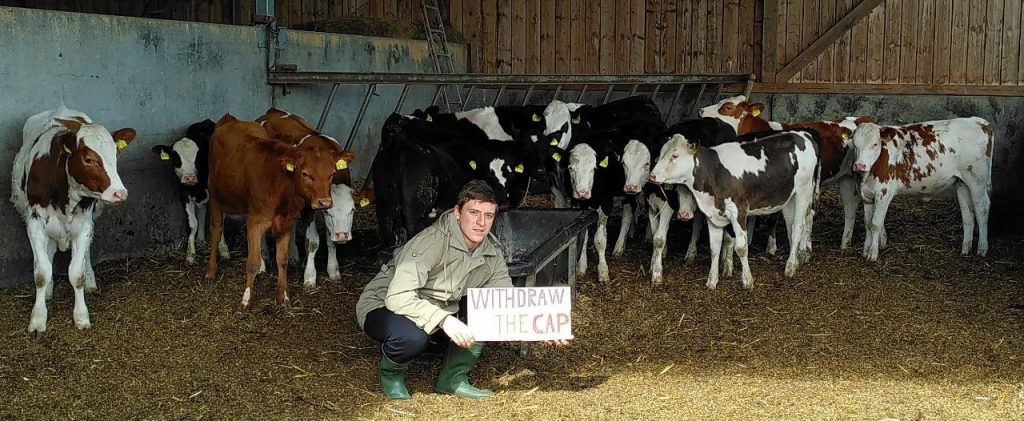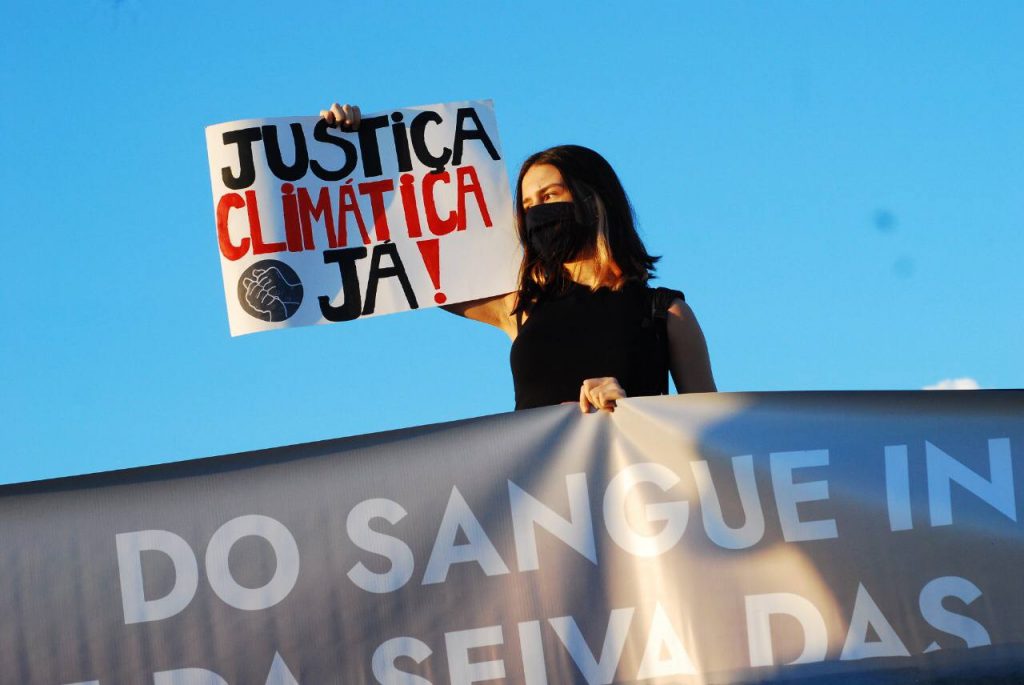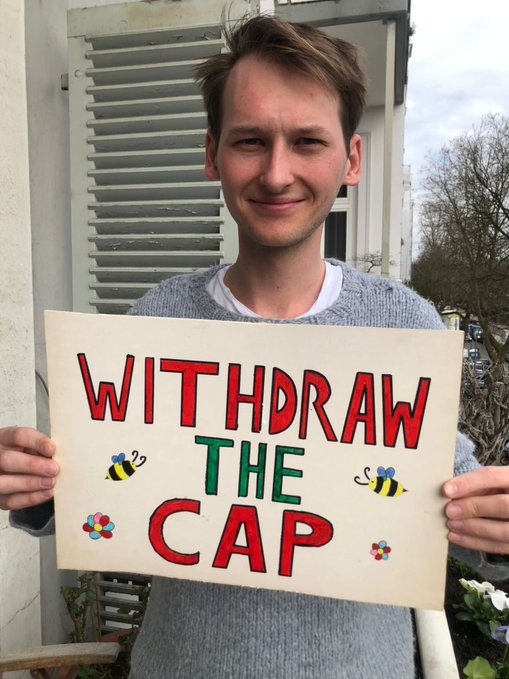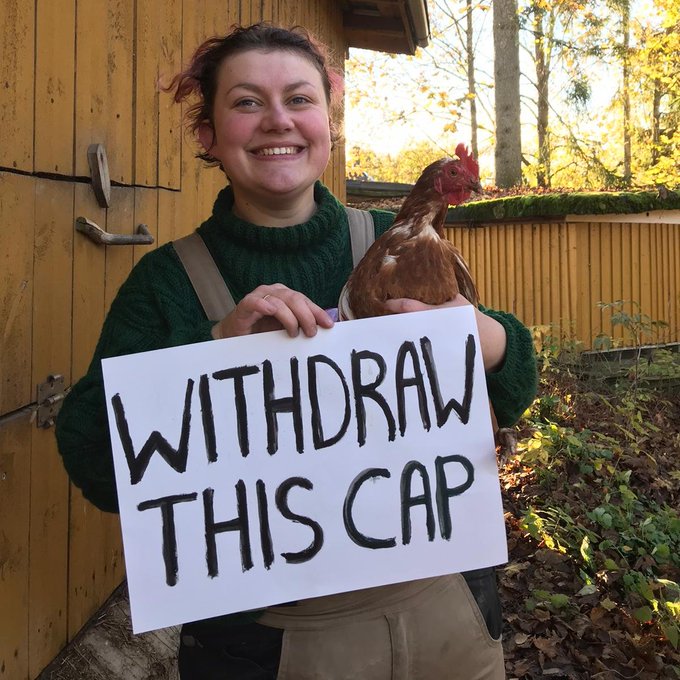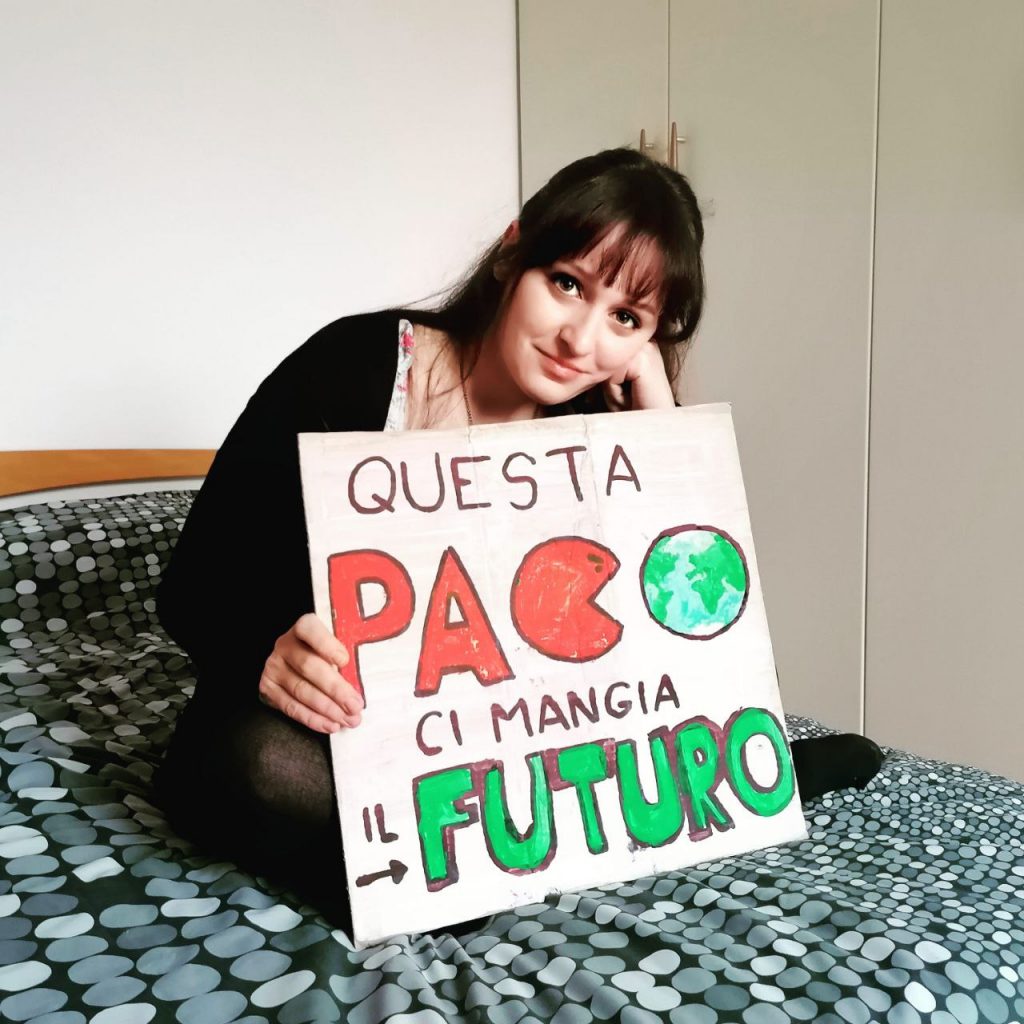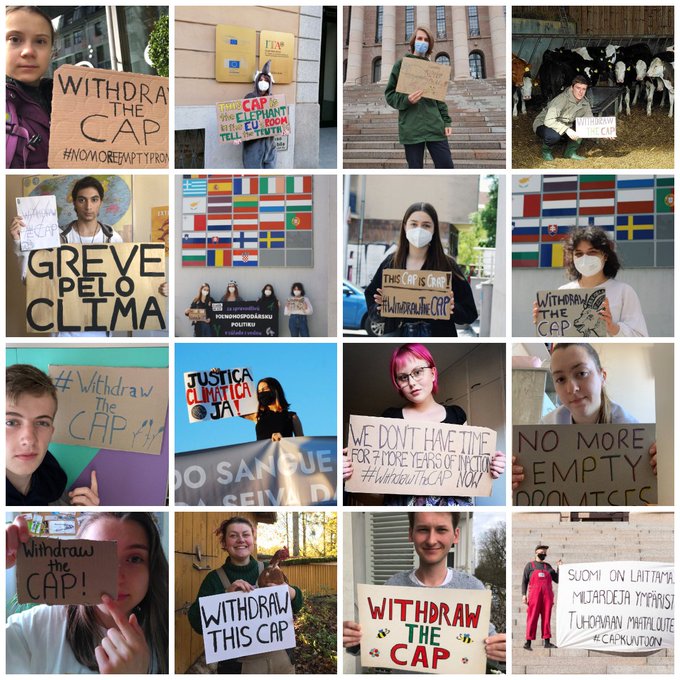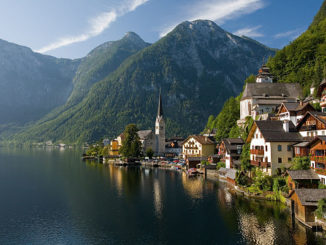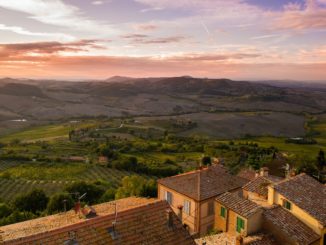The Withdraw the CAP movement emerged in recent months to challenge Europe’s biggest policy spend. This initiative of young people, many climate strikers from the Fridays for Future movement, have taken the EU’s top brass to task over the gap between environmental rhetoric and business-as-usual reality. So what happened at their meeting last week with Vice-President of the EU Commission Frans Timmermans, of EU Green Deal fame? Here the group who met him give us the lowdown, and tell us what they are focused on next for Withdraw the CAP.
By Sommer Ackerman, Maximilian Herzog, Valentina Ruas and Martina Comparelli
On Monday the 17th of May, several activists, from our campaign #WithdrawTheCAP, Sommer Ackerman, Maximilian Herzog, Valentina Ruas and Martina Comparelli in addition to Greta Thunberg, Luisa Neubauer, Anuna De Wever and Adélaïde Charlier, met with the Vice-President of the EU Commission, Frans Timmermans to ask for the EU’s Common Agricultural Policy (CAP) to be withdrawn. This meeting was well-timed as the final trilogue is set for May 25th/26th and this is the last opportunity for the policy to be scrapped by the Commission, which we as activists, NGO’s and scientists have been calling for.
The meeting with Timmermans was rather disappointing as he confirmed that the EU Commission would not Withdraw the CAP – despite the lack of alignment with the Green Deal. But this did not come as much of a surprise. The main reason that we wanted to meet with Timmermans in the first place was to bring light to the injustices of this policy and to bring attention to the voices of our activists.
This is what Valentina Ruas (above), an activist from Brazil living in Portugal, had to say in response to the meeting with the Vice-President: “One point which is not brought up enough within CAP discussions is how Europe has a historical responsibility towards MAPA (Most Affected People and Areas, or Global South) for having created the roots for inequality and an economic system that makes the region be the most affected by the climate crisis. Therefore, European leaders cannot dissociate their actions from the consequences that MAPA might have, which currently are many. We must recognise that, in a globalised world where patterns of development have been shaped by colonialism and unjust relations, discussions such as the future of CAP need to be visualised beyond the EU territory, where agricultural and trade policies have a huge say in what happens to communities worldwide, and it’s our duty to hold these leaders accountable and demand justice for MAPA.
In the meeting we had with Timmermans, he said that he prioritises the livelihood of the most vulnerable, but this was right after telling me that what they can do to “neutralise” the effects of their exploitation in MAPA is putting “warnings” on products that come from deforestation. This way, they put their responsibility on consumers, instead of tackling the problem by the root with the only reasonable solution- stopping deforestation and consequently other environmental and social issues connected to it. While some people get to choose if they’ll cook their beef derived from exploitation or not, others are literally dying and being displaced because of that. He also admitted there is indeed political will to impose regulations and promote the systemic change we need, but that “change doesn’t happen overnight”. When then? 2030,40,50…? And with politics full of loopholes that make them easy not to be fulfilled? We don’t have time for the usual shallow politician talk.
We need to keep pushing for a better CAP, always mentioning how Europe must take the lead in developing policies that have at their main core climate justice and the accountability to MAPA. It’s about time we show them that we can’t accept more commitments full of loopholes that keep harming so many vulnerable communities.”
Here is what activist, Maximilian Herzog from Germany had to say about the meeting: ”During our meeting with Vice-President Timmermans, we used the precious time we got to ask the tough questions straight away. What worth does the new EU Climate Law have if the CAP reform will not even include a greenhouse gas emissions reduction target? How can Europe continue with such a destructive policy in a crisis where the carbon budget to limit global warming to 1.5°C will be used up in only 6 years and 7 months? The answer that followed our question was highly ambivalent. On the one hand, in contrast to what other Commission representatives had told us in numerous meetings before (that we did not have to worry at all), Timmermans acknowledged the insufficiencies of the CAP reform. He called it “far from perfect” and “incremental change”. Most importantly, and shockingly, Timmermans acknowledged that with this CAP reform we would risk striking crucial tipping points in both climate and biodiversity (striking those tipping points would lead to an acceleration of climate change and biodiversity loss, therefore causing irreversible damage).
So the real question then must be: how can we NOT withdraw this CAP proposal if we are aware of its consequences? Also, how can the Commission expect to be taken seriously in other ongoing negotiations like the EU Taxonomy, if in the most decisive moment, they did not do everything in their power to stop this CAP? As the CAP is one (big) fight of many on the European level, the Commission and also Timmermans are about to lose a massive amount of credibility- and we made that really clear to them.”
Sommer Ackerman, an activist from the UK based in Finland had this to say about the meeting: “We have met with scientists, farmers, NGO’s and now many people in the Commission and what is clear is that the CAP needs to be withdrawn. We are determined, we are educated and we are ready to say the truth and I believe that people are beginning to see that. I came away from the meeting with Timmermans feeling quite hopeless. In the meeting, Timmermans said that it wasn’t his job to tell people what to do or what to eat and he gave an example about deforestation. He said that what he could do was inform people on whether their food comes from a source of deforestation by putting labels on products, then people are free to make their own choices. I was quite shocked at this, the people in charge should not create solutions as a result of problems, but instead, find solutions to the root of the problem.
While our movement and the Commission are technically on the same side, we are both on the opposite ends of that spectrum. The Commission is doing what is favourable, but not what is right for our planet and its people. This has been an intense journey of trying to get people who know nothing about agricultural policies to care about what is going on right in front of them.
Our planet is in a crisis, we do not have time to wait, especially another 7 years just for this to happen all over again. We have been told exactly the same stuff in the last reform: that the CAP will be greener and fairer. But then the Parliament and Council weakened it. We cannot be told this in another 7 years. The Commission said it is their job to reject bad proposals from member states, but when the member states come back with proposals that look to give money to harmful measures like intensive livestock farming and limited space for nature, will we see these being rejected?
What we need is radical change, what we need is a true reform that cares about our planet and its people. How am I meant to feel hopeful when it is so hard to even be acknowledged? I am tired. It is not my job to be a full-time activist and work myself to the bone to try and make a world in which we have a fair agricultural policy. Finally, Timmermans thanked us for doing what we do as activists and to that I say: if you respect us as much as you say you do, why won’t you act on your words?”
Martina Comparelli, an activist from Italy said about the meeting: “withdrawing this CAP would mean much more than trying to pass a more ambitious one. It would be a strong signal that things are changing and that the EU is finally beginning to treat the climate crisis like a crisis.”
In addition to the meeting with Timmermans, on the 21st of May, 6 activists of our movement – Maya Ozbayoglu, Simon Sterck, Abbie Williams, João Duccini, Greta Thunberg and Pessi Päivärinne – met with the Member of the European Parliament and the S&D Group, Jytte Guteland. Our activists made clear that the Common Agricultural Policy of the EU is certainly not a policy that prioritises people, the farmers, the planet and biodiversity over profit and intensive farming. Our activists urged the Swedish MEP that she and the S&D group should vote this CAP down during the final plenary voting that is expected for later this year.
The #WithdrawTheCAP is a diverse movement. While a lot of us may be from Fridays For Future, we are also farmers, students, scientists, old and young and from all over the world. Whoever we are, we are brought together by the injustice of the CAP and the need to do something about it. While this proposed policy is a disaster for the climate and biodiversity, it is also extremely unfair to the smaller and more sustainable farmers in Europe.
“Small farms are significantly important for ecologically sustainable agriculture. In order to protect the planet, we need to acknowledge that we are not superior to mother nature, we are a part of her and we completely rely on her. Small farmers have this stronger bond to their animals, their fields, their local customers and most importantly, the nature around them because they completely rely on them. In conclusion, we need them to fight the biodiversity and climate crisis” says Tobias Schied (first photo in this article), a climate activist with an agricultural background living in a small village in southern Germany.
What’s next?
Our hopes for the final trilogues are not very high at all, as we know that the Commission will not withdraw the current proposal. Due to the fact that after the trilogue the CAP is to be voted in the European Parliament in Plenary, our activists will focus their efforts on meeting with MEPs. On this journey, we will especially focus on members of the S&D and Renew groups, as by joining the conservative European People’s Party (EPP) they facilitated a majority in the last CAP vote in October 2020. We will make it clear that anyone who claims to be green, progressive and then votes in favour of the current CAP is doing nothing, but not telling the truth: i.e. greenwashing and sending a false signal to the public. One cannot be socially progressive and in favour of bold climate action and at the same time support a policy that doesn’t even include an emission reduction plan. This CAP will continue to finance the very few, those who have the most land. But from 2007-2018 alone, we lost 4 million farms in Europe! We now need a policy that is adequate to our times and to the social and ecological crises that humanity is facing.
The first step is to withdraw the current CAP proposal. But since this CAP will most likely not be withdrawn by the Commission, our message will now be targeted towards the MEPs: #VoteThisCAPdown !
More
Hidden Formulas and Agri-Media – Can we Find a Fair CAP in Ireland?
More on CAP Strategic Plans
CAP Strategic Plans: Germany Taking Steps in the Right Direction?
CAP Strategic Plans: Support to High-Nature-Value Farming in Bulgaria
Commission’s Recommendations to CAP Strategic Plans: Glitters or Gold?
German Environment Ministry Proposals For CAP Green Architecture
CAP Performance Monitoring and Evaluation Framework – EP Position
A Rural Proofed CAP post 2020? – Analysis of the European Parliament’s Position
CAP Beyond the EU: The Case of Honduran Banana Supply Chains
CAP | Parliament’s Political Groups Make Moves as Committee System Breaks Down
CAP & the Global South: National Strategic Plans – a Step Backwards?
CAP Strategic Plans on Climate, Environment – Ever Decreasing Circles
European Green Deal | Revving Up For CAP Reform, Or More Hot Air?
Climate and environmentally ambitious CAP Strategic Plans: Based on what exactly?
How Transparent and Inclusive is the Design Process of the National CAP Strategic Plans?

